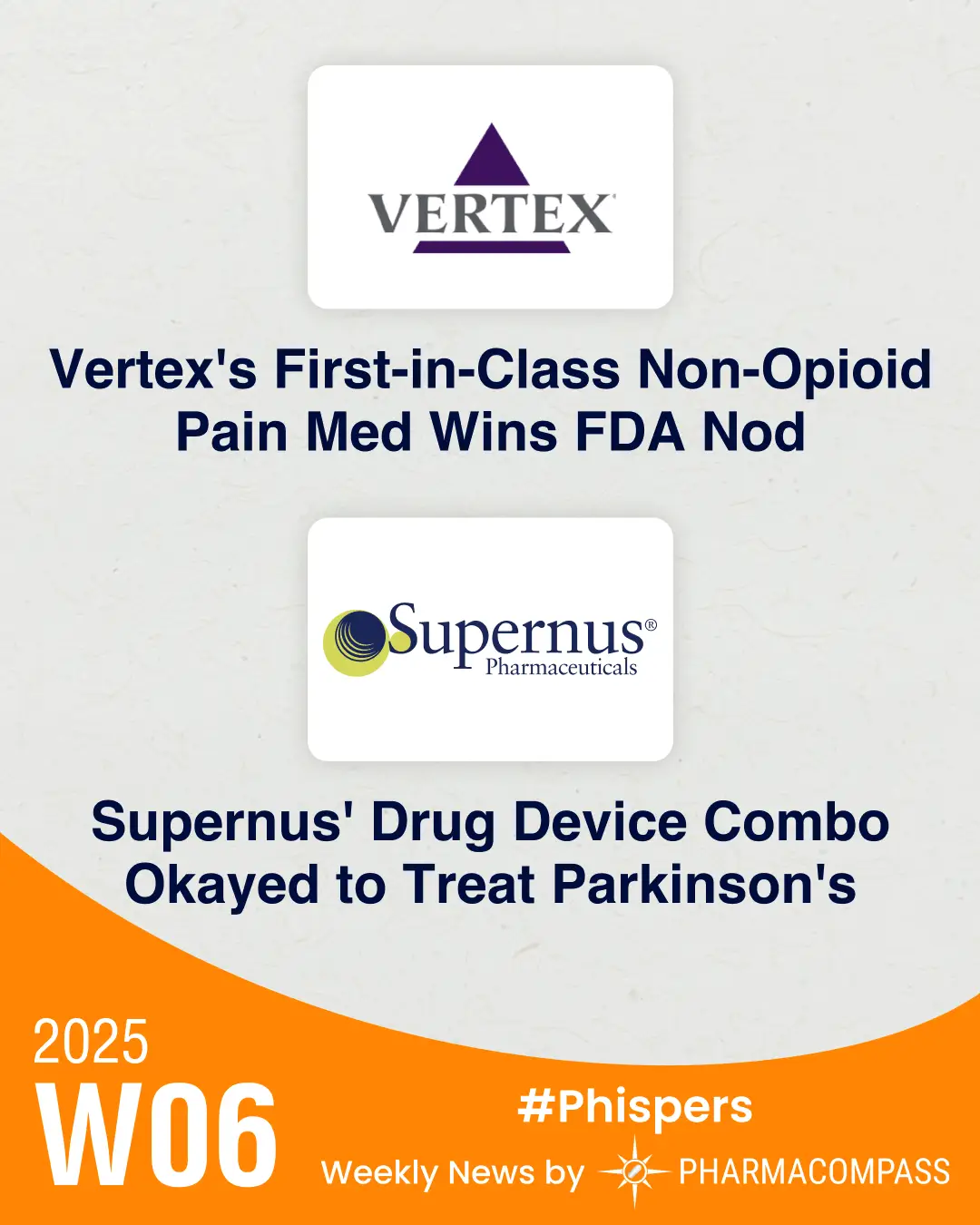
By PharmaCompass
2025-02-06
Impressions: 620 (Article) || 39 (Video)
While the healthcare sector in the US was embroiled in political uncertainties over tariffs and key appointments, the country’s Food and Drug Administration (FDA) focused on approving new classes of drugs and drug-device combinations.
Vertex Pharmaceuticals made headlines with the FDA approval of Journavx, a groundbreaking non-opioid painkiller that offers a safer alternative to traditional opioids. After setbacks, Axsome Therapeutics’ dual-action migraine treatment, Symbravo, finally received an FDA approval.
In the realm of Parkinson’s disease treatment, Supernus Pharmaceuticals received FDA approval for Onapgo, a wearable drug-device combination designed to improve motor control. Roche also expanded the use of its Susvimo eye implant to treat diabetic macular edema, offering a continuous delivery system that reduces treatment burden.
Meanwhile, Sanofi announced a US$ 5.21 billion share buyback program following the announcement of the € 15.5 billion (US$ 16.1 billion) sale of its consumer healthcare unit, Opella, likely to go through in the second quarter of 2025. GSK also launched a US$ 2.5 billion share buyback and raised its long-term sales target to nearly US$ 50 billion by 2031.
AbbVie, on the other hand, appears to have smoothly navigated the decline in Humira sales, raising its long-term outlook for its immunology duo, Skyrizi and Rinvoq, with combined sales projected to exceed US$ 31 billion by 2027. However, Merck announced a halt in Gardasil vaccine shipments to China amid weak demand, impacting its financial guidance and long-term sales targets. And Alvogen issued a nationwide recall for some of its fentanyl patches due to a packaging defect that poses a major overdose risk.
FDA approves Vertex’s non-opioid painkiller that blocks pain at source
FDA has approved Vertex Pharmaceuticals’ non-opioid painkiller, Journavx (suzetrigine), for the treatment of moderate-to-severe acute pain in adults. This approval marks the first new class of pain medication in over two decades offering an alternative to opioid analgesics. Journavx functions by blocking pain signals at their source before they reach the brain. It works without affecting the brain’s reward centers. This mechanism reduces the risk of addiction associated with traditional opioids. Analysts estimate that the drug could generate approximately US$ 3.7 billion in US sales by 2030.
Axsome’s migraine treatment okayed: Axsome Therapeutics has finally received FDA’s greenlight for its migraine treatment, Symbravo. This multi‐mechanistic medication combines meloxicam and rizatriptan with the aim to provide rapid pain relief and sustained efficacy by targeting multiple migraine pathways. Clinical studies demonstrated that a single oral dose of the novel drug helped patients return to normal functioning within two hours. It was a hard-fought win for Axsome after the agency declined to approve the drug in 2022 over issues regarding quality control processes that were unresolved.
Sanofi signals M&A push, plans US$ 5.21 bn share buyback after US$ 16.11 bn sale of Opella
Sanofi plans to repurchase € 5 billion (US$ 5.21 billion) worth of its shares in 2025, following the anticipated sale of its Opella consumer healthcare unit to private equity firm Clayton, Dubilier & Rice (CD&R) for € 15.5 billion (US$ 16.11 billion). The move signals a strategic shift towards focusing on innovative medicines and vaccines. Sanofi will retain a 50 percent stake in Opella, with plans to divest this holding in the future. The French giant also indicated it could be “a bit more” active with mergers and acquisitions in the near future. As part of Sanofi’s share buyback program, L’Oréal has agreed to sell a € 3 billion (US$ 3.11 billion) stake in Sanofi back to the drugmaker.
GSK launches US$ 2.5 bn share buyback: GSK has launched a £ 2 billion (US$ 2.5 billion) share buyback and raised its long-term sales target to nearly US$ 50 billion by 2031, largely driven by robust growth in its specialty medicines such as HIV and cancer treatments. Despite vaccine sales falling in 2024 by 4 percent due to Arexvy losing 51 percent in sales, the British drugmaker’s oncology section saw a 98 percent increase in sales. Its antibody-drug conjugate (ADC) portfolio will be key, the company said, highlighting its recent IDRx acquisition and the launch of its multiple myeloma drug Blenrep (belantamab mafodotin).
FDA approves Supernus’ wearable drug‐device combination for Parkinson’s disease
Supernus Pharmaceuticals has received FDA approval for its drug‐device combination, Onapgo, for the treatment of motor fluctuations in adults with advanced Parkinson’s disease. This marks the culmination of a years‐long effort after previous rejections in 2022 and 2024 due to concerns over product quality. Onapgo is a wearable device that continuously delivers apomorphine hydrochloride under the skin throughout the waking day.
Roche’s Susvimo expanded to treat diabetic macular edema: Roche has gained FDA approval for a label expansion of its Susvimo eye implant to include the treatment of diabetic macular edema (DME), a leading cause of vision loss in adults with diabetes. This approval builds on the implant’s initial indication for treating neovascular (wet) age-related macular degeneration (nAMD). Susvimo (ranibizumab injection) is the first and only continuous delivery treatment approved by the FDA for DME.
AbbVie raises sales outlook for Skyrizi, Rinvoq; Merck halts Gardasil shipments to China
AbbVie has raised its long-term outlook by US$ 4 billion for its two leading immunology drugs, Skyrizi (risankizumab) and Rinvoq (upadacitinib), now forecasting their combined 2027 sales to exceed US$ 31 billion. The updated projection expects Skyrizi to generate more than US$ 20 billion in revenue, while Rinvoq is anticipated to contribute over US$ 11 billion by 2027. Skyrizi currently holds 40 percent of the total prescription share of the biologics psoriasis market, the company noted.
Gardasil shipments to China: Merck announced it would halt shipments of its flagship Gardasil vaccine to China at least until mid-year. This decision comes amid economic challenges, weak demand and an anti-corruption campaign led by the government in China. The move has directly impacted Merck’s guidance for the full year 2025. Gardasil, the vaccine designed to prevent cancers caused by human papillomavirus (HPV), has experienced declining sales in China.
Alvogen recalls fentanyl patches after report of serious adverse event
Alvogen has issued a voluntary nationwide recall for one lot of its fentanyl transdermal system 25 mcg/h patches due to a potential packaging defect. According to the FDA recall notice, the defect involves the risk that patches could be inadvertently stacked (i.e. multi-stacked) within a single product pouch. This stacking error could result in a significantly higher dose than intended, thereby posing a risk of serious, life-threatening, or even fatal respiratory depression.
The PharmaCompass Newsletter – Sign Up, Stay Ahead
Feedback, help us to improve. Click here
Image Credit : Phisper Infographic by PharmaCompass license under CC BY 2.0
“ The article is based on the information available in public and which the author believes to be true. The author is not disseminating any information, which the author believes or knows, is confidential or in conflict with the privacy of any person. The views expressed or information supplied through this article is mere opinion and observation of the author. The author does not intend to defame, insult or, cause loss or damage to anyone, in any manner, through this article.”







